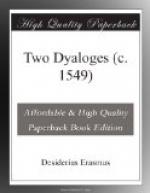Produced by David Starner, Louise Hope and the PG Online Distributed Proofreading Team
[Transcriber’s note: The original text has no page numbers. Page breaks have been marked with double lines || like this. Three apparent typographic errors were corrected and are listed at the end of this text. All other spelling and punctuation are as in the original.]
* * * * * * * * * * * * * *
[C]Two dyaloges
wrytten in laten
by the famous clerke. D. Eras-
mus of Roterodame/ one called
Polyphemus or the gospeller/
the other dysposyng of thynges
and names/ translated
in to Englyshe by
Edmonde
Becke.
And prynted at Cantorbury
in saynt Paules paryshe
by John Mychell.
[+]
* * * * *
The preface to the Reader.
Lucius Anneus Seneca amonge many other pratie saienges (gentle reder) hathe this also, whiche in my iudgement is as trew as it is wittie. Rogado cogit qui rogat superior. And in effecte is thus moch to say, yf a manes superior or his better desyre any thige, he might aswell comade it by authoritie as ones to desyre it.
A gentleman a nere cosyn of myne, but moch nerer in fryndshyp, eftesones dyd instant and moue me to translate these two dyaloges folowynge, to whose getlenes I am so moch obliged, indetted and bounde, that he myght well haue comaunded me to this and more paynes: to whome I do not onely owe seruyce, but my selfe also. And in accoplysshynge of his most honest request (partly by cause I wolde not the moost inhumane fawte of Ingratitude shuld wor||thely be imputed to me, & that I might in this thynge also (accordynge to my bounden dutie) gratifie my frende) I haue hassard my selfe in these daungerous dayes, where many are so capcyous, some prone and redy to malygne & depraue, and fewe whose eares are not so festidious, tendre, and redy to please, that in very tryfles & thynges of small importaunce, yet exacte dylygence and exquisite iudgement is loked for and requyred, of them whiche at this present wyll attempte to translate any boke be it that the matter be neuer so base. But what diligence I have enployed in the translacio hereof I referre it to the iudgement of the lerned sort, whiche coferynge my translacion with the laten dyaloges, I dowte not wyl condone and pardone my boldnesse, in that that I chalenge the semblable lybertie whiche the translatours of this tyme iustlie chalenge. For some heretofore submytting them selfe to seruytude, haue lytle ||respecte to the obseruacio of the thyng which in translacyo is of all other most necessary and requisite, that is to saye, to rendre the sence & the very meanyng of the author, not so relygyouslie addicte to translate worde for worde, for so the sence of the author is oftentimes corrupted & depraued, and neyther




